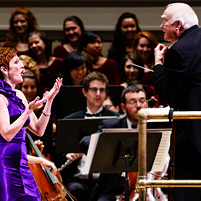A Chorus of Appreciation

It's Music Education Week and no more fitting time to celebrate the enduring contributions of one of Carnegie Mellon University's finest — Maestro Robert Page, Paul Mellon University Professor of Music emeritus and former Director of Choral Studies. He retired in May.
Dubbed the "Dean of American Choral Conductors," Page's honors include eight Grammy nominations and two wins, a Grand Prix du Disque (France's premiere award for musical recordings), a Prix Mondial de Montreux and Pennsylvania's "Artist of the Year" award. The American Record Review referred to Page as "a national treasure."
He has served as director/conductor of the Mendelssohn Choir of Pittsburgh, the chorus of choice of the Pittsburgh Symphony Orchestra, and was given the title director of special projects for the PSO. Page premiered numerous works by influential living composers, including Samuel Barber, Alberto Ginastero and Kristof Penderecki.
Page came to CMU in 1975 having already recorded dozens of works with the Philadelphia and Cleveland orchestras, eager to use his experience to enrich student instruction.
"I wanted to bring into the School of Music the professionalism necessary to succeed in the field," Page said. "I have always straddled the fence between academia and professional life. In the arts particularly, both are necessary fabrics in making a rich cloth."
"The teacher's experiences can provide students with the tools to solve the problems they will face," he continued. "My goal as a teacher at Carnegie Mellon was helping students to become functioning, independent musicians — and the key word is independent."
While at CMU, Page's role expanded to encompass the choral program, the graduate conducting program and the operas, among other responsibilities.
His pedagogical legacy continues through his former graduate students, now almost all professional conductors who include the choral heads of the Harvard and Yale university programs.
It seems Page was destined for a life in music.
"I've been in choral music almost since I was born," he remarked. "It goes all the way back to my church background where the music was all a capella, congregational singing. From the very first I was standing in front of the congregation leading their singing. It's part of my life, my DNA."
But while the church fed his passion, his parents instilled it.
"My father, a song leader, believed that music was, next to being an elder in the church, the most important thing," Page explained. "My mother thought if you don't love music, you're not a worthwhile citizen. I'm the eighth of 10 children. She taught every one of us piano as far as she could, then insisted all 10 study an instrument through high school — which neither parent had the chance to finish."
His committed mother bartered to pay for music lessons, as did Page himself, dictating music to his blind piano teacher for her transfer to a braille typewriter — an activity he found "valuable musical training" in itself.
He's shared that passion with generations of students, and they return the favor.
"Students don't realize that they teach the teachers more than we teach them," Page observed. "No two students are alike — each one brings a certain aura, a certain desire that signifies they are unique. And that's particularly true at Carnegie Mellon, one of the singular places in the country, if not the world."
"It's the focus," he added. "I believe that the venue in which you work is almost as important as the subject of your playing. If the atmosphere is one that encourages the best of you, you're going to thrive."
Photo: Robert Page conducting the Carnegie Mellon Philharmonic and Choirs at Carnegie Hall (NYC) in 2012 with alum Lisa Vroman as soloist.
Related Links: Honoring Maestro Robert Page [.pdf] | College of Fine Arts | School of Music
